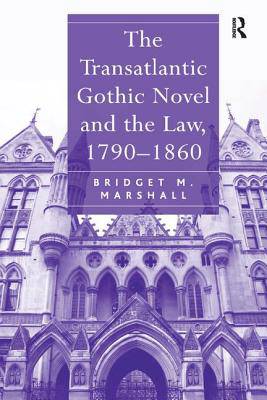
- Afhalen na 1 uur in een winkel met voorraad
- Gratis thuislevering in België vanaf € 30
- Ruim aanbod met 7 miljoen producten
- Afhalen na 1 uur in een winkel met voorraad
- Gratis thuislevering in België vanaf € 30
- Ruim aanbod met 7 miljoen producten
Zoeken
€ 195,95
+ 391 punten
Uitvoering
Omschrijving
Tracing the use of legal themes in the gothic novel, Bridget M. Marshall shows these devices reflect an outpouring of anxiety about the nature of justice. On both sides of the Atlantic, novelists like William Godwin, Mary Shelley, Charles Brockden Brown, and Hannah Crafts question the foundations of the Anglo-American justice system through their portrayals of criminal and judicial procedures and their use of found documents and legal forms as key plot devices. As gothic villains, from Walpole's Manfred to Godwin's Tyrrell to Stoker's Dracula, manipulate the law and legal system to expand their power, readers are confronted with a legal system that is not merely ineffective at stopping villains but actually enables them to inflict ever greater harm on their victims. By invoking actual laws like the Black Act in England or the Fugitive Slave Act in America, gothic novels connect the fantastic horrors that constitute their primary appeal with much more shocking examples of terror and injustice. Finally, the gothic novel's preoccupation with injustice is just one element of many that connects the genre to slave narratives and to the horrors of American slavery.
Specificaties
Betrokkenen
- Auteur(s):
- Uitgeverij:
Inhoud
- Aantal bladzijden:
- 214
- Taal:
- Engels
Eigenschappen
- Productcode (EAN):
- 9780754669951
- Verschijningsdatum:
- 28/12/2010
- Uitvoering:
- Hardcover
- Formaat:
- Genaaid
- Afmetingen:
- 156 mm x 234 mm
- Gewicht:
- 458 g

Alleen bij Standaard Boekhandel
+ 391 punten op je klantenkaart van Standaard Boekhandel
Beoordelingen
We publiceren alleen reviews die voldoen aan de voorwaarden voor reviews. Bekijk onze voorwaarden voor reviews.











